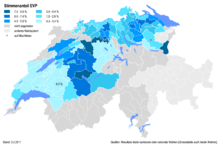Evangelical People's Party of Switzerland
The Evangelical People's Party of Switzerland (German: Evangelische Volkspartei der Schweiz, French: Parti évangelique suisse, Italian: Partito Evangelico Svizzero, Romansh: Partida evangelica da la Svizra) is a Protestant[6] Christian-democratic political party in Switzerland, active mainly in the Cantons of Bern, Basel-Land, Basel-Stadt, Aargau and Zürich.[7] "Evangelical" translates as evangelisch, the German term for "Protestant", as opposed to "evangelical" as used in Anglo-Saxon Christianity.

Evangelical People's Party of Switzerland | |
|---|---|
 | |
| German name | Evangelische Volkspartei der Schweiz (EVP) |
| French name | Parti évangelique suisse (PEV) |
| Italian name | Partito Evangelico Svizzero (PEV) |
| Romansh name | Partida evangelica da la Svizra (PEV) |
| President | Marianne Streiff |
| Founded | 1919 P. Christian Protestant 1994 Swiss Evangelical P. |
| Headquarters | Josefstrasse 32 Case Postale 3467 8021 Zürich |
| Membership (2015) | 4,600[1] |
| Ideology | Christian democracy[2] Social conservatism[2] Stewardship theology[3] |
| Political position | Fiscal: Centre[4] to centre-left[5] Social: Centre-right |
| European affiliation | European Christian Political Movement |
| Colours | Yellow Blue |
| National Council | 3 / 200 |
| Council of States | 0 / 46 |
| Cantonal Executives | 0 / 154 |
| Cantonal legislatures | 39 / 2,609 |
| Website | |
| www | |
Swiss Federal Council Federal Chancellor Federal Assembly Council of States (members) National Council (members) Voting | |
The EVP is conservative on euthanasia, abortion, registered partnerships and other typically Christian issues, centrist on economic issues and stands rather centre-left on issues of wealth redistribution, education, environmentalism and immigration. Among other things, it claims to be "dedicated to protecting the environment out of a sense of responsibility for Creation" and states that "the ethical values of the Bible should be the foundation of society."[3]

The EVP is a member of the European Christian Political Movement (EPCM) and was previously an observer member of the European People's Party (EPP) until 2008. In the Federal Assembly of Switzerland the EVP forms a joint group along with the Christian Democratic People's Party (CVP) and the Christian Social Party of Obwalden (CSP OW).[8]
References
- The Swiss Confederation — A Brief Guide. Federal Chancellery. 2015. p. 20. Archived from the original (PDF) on December 20, 2016. Retrieved December 14, 2016.
- Nordsieck, Wolfram (2019). "Switzerland". Parties and Elections in Europe. Retrieved 9 November 2019.
- Mombelli, Armando (July 25, 2015). "Small Parties of Protest and Principle". Swissinfo. Retrieved December 15, 2016.
- Gerber, Marlène; Mueller, Sean (October 23, 2015). "4 Cool Graphs that Explain Sunday's Swiss Elections". The Washington Post. Retrieved December 13, 2016.
- The Swiss Confederation – a brief guide (PDF). Switzerland: Swiss Confederation. Federal Chancellery, Communication Support. 2016. p. 18. Retrieved December 11, 2016.
- "Switzerland—Political Parties". European Election Database (EED). Norwegian Centre for Research Data. Retrieved 31 March 2018.
- https://web.archive.org/web/20141103083828/http://www.parties-and-elections.eu/switzerland3.html. Archived from the original on November 3, 2014. Retrieved August 19, 2014. Missing or empty
|title=(help) - https://web.archive.org/web/20140429051157/http://www.parlament.ch/e/organe-mitglieder/bundesversammlung/fraktionen/fraktionen-49-legislatur/Pages/default.aspx. Archived from the original on April 29, 2014. Retrieved April 28, 2014. Missing or empty
|title=(help)